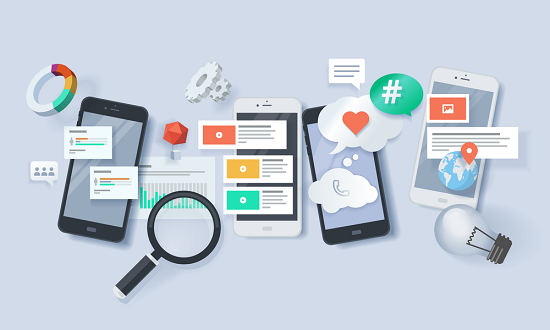From Pixel Perfection to Powerful Knowledge: Unveiling the 1000 Faces of AI Software
Case Studies
Artificial intelligence (AI) software has woven itself into the fabric of our daily lives, quietly revolutionizing the way we work, interact, and even express ourselves creatively. Its potential seems to expand with each passing day, encompassing applications that range from the delightfully whimsical to the world-changing. Let’s embark on a journey through this exciting realm and explore some of the most fascinating ways AI software is transforming our world.
1. Unleashing Your Inner Da Vinci: The Magic of AI Photo Editing
Remember the days of painstakingly editing photos, pixel by pixel? Thankfully, those days are a thing of the past. AI photo editors have arrived, wielding sophisticated algorithms that enhance your photos with stunning results. Imagine restoring a faded family portrait from your grandparents’ attic to its former glory, or adding a touch of artistic flair to your latest travel snaps – all with just a few clicks. Text-based AI photo editors take this concept even further, granting you the power to transform your photos with the magic of words. Yearning to turn your summer vacation picture into a vibrant Van Gogh-inspired masterpiece? Simply describe your desired style, and the AI will work its magic, blurring the lines between reality and artistic expression.
2. Empowering Businesses with the Brains of an AI: The Rise of the AI Knowledge Base
Knowledge is power, and for businesses, a well-structured knowledge base is the cornerstone of efficient operations. AI knowledge bases take this concept a step further by leveraging the immense capabilities of artificial intelligence. These innovative platforms can analyze vast quantities of data and user interactions, allowing them to automatically generate and maintain comprehensive knowledge repositories. This empowers businesses in several ways. Imagine a self-service portal where customers can find answers to their questions without needing to contact support, or an easily accessible knowledge base that provides employees with the information they need to excel in their roles. GetGuru.com is a shining example of an AI knowledge base platform that leverages the power of AI to create a powerful and dynamic knowledge management solution.
Start your Shopify 14-day trial with FireApps
Did you know Shopify is now accounting for 20% of the e-commerce business.
Over 2200 merchants open their Shopify store everyday and 50% of them have a repeat purchase. Join them today!

3. AI Software: Transforming Industries One Code Line at a Time
The impact of AI software extends far beyond the realms of photo editing and knowledge management. In the healthcare industry, AI is being used to analyze medical scans with unprecedented accuracy, leading to earlier disease detection and potentially life-saving interventions. The finance sector is utilizing AI for fraud prevention and algorithmic trading, safeguarding financial transactions and optimizing investment strategies. Even the creative world is embracing AI, with tools that can generate original music compositions, write compelling scripts, and even craft captivating stories. As AI technology continues to evolve at an exponential rate, we can expect even more groundbreaking applications to emerge, forever changing the landscapes of countless industries.
4. AI for Education: Personalized Learning Pathways
The traditional one-size-fits-all approach to education is slowly fading into the background. AI software offers the potential to personalize the learning experience for each student. Imagine an AI-powered platform that tailors educational content to a student’s individual learning style, pace, and strengths. This could involve creating personalized lesson plans, recommending learning materials that resonate with the student’s interests, and providing real-time feedback to reinforce understanding. AI-powered tutors could offer additional support, patiently answering questions and guiding students through challenging concepts. This level of personalization has the potential to revolutionize the educational landscape, fostering a more engaging and effective learning environment for all.
5. AI for Entertainment: From Curated Content to Interactive Experiences
AI software is poised to transform the way we experience entertainment. Imagine an AI-powered recommendation engine that curates a personalized entertainment feed, suggesting movies and shows that perfectly align with your unique tastes. This could eliminate the dreaded “decision fatigue” of scrolling through endless options, leading you straight to content you’ll genuinely enjoy. AI could also play a role in creating more interactive entertainment experiences. Imagine video games that adapt to your playstyle, or virtual reality experiences that react to your emotions in real-time. The possibilities are truly endless, and AI promises to usher in a new era of immersive and personalized entertainment.
6. AI for Customer Service: Beyond the Bots
Customer service is another area ripe for AI-powered transformation. AI chatbots have become commonplace, offering basic support and answering frequently asked questions. However, the future of AI customer service lies in creating a more seamless and personalized experience. Imagine AI-powered virtual assistants who can understand natural language, empathize with customer concerns, and even resolve complex issues without human intervention. These AI assistants could handle routine inquiries, freeing up human customer service representatives to focus on more intricate cases that require a personal touch.
7. AI for Content Creation: From Writer’s Block to Creative Spark
7. AI for Content Creation: From Writer’s Block to Creative Spark (continued)
The world of content creation is no stranger to the transformative power of AI software. Writers can leverage AI-powered tools to overcome writer’s block, generate creative ideas, and even check their work for grammar and plagiarism. Imagine an AI assistant that suggests relevant topics and outlines, or even drafts initial paragraphs to kickstart your writing process. These tools can be invaluable for bloggers, journalists, and even students struggling to meet deadlines.
However, AI isn’t here to replace human creativity. Instead, it aims to empower creators by streamlining workflows and sparking new ideas. The future of AI in content creation might involve collaborative efforts, where humans and AI work together to produce truly exceptional content.
8. AI for Social Good: Tackling Global Challenges
The potential of AI software extends far beyond commercial applications. AI can be a powerful tool for tackling some of humanity’s most pressing challenges. In the fight against climate change, AI can be used to analyze climate data, predict weather patterns, and optimize energy usage. AI-powered robots can assist in disaster relief efforts, navigating dangerous terrain and providing essential aid to those in need.
In the realm of global health, AI can be used to analyze disease outbreaks, develop personalized treatment plans, and even accelerate drug discovery. Imagine AI-powered systems that can diagnose diseases with unparalleled accuracy, leading to earlier interventions and improved patient outcomes. The possibilities for using AI for social good are vast, and hold immense promise for creating a better future for all.
9. The Ethical Considerations of AI: A Balancing Act
As with any powerful technology, AI software comes with its own set of ethical considerations. Bias in AI algorithms can lead to discriminatory outcomes, and the potential for job displacement due to automation is a real concern. It’s crucial to develop and implement AI responsibly, ensuring transparency, fairness, and accountability.
Explainable AI (XAI) is a critical area of research, aiming to make AI decision-making processes more understandable by humans. This transparency is essential for building trust in AI and ensuring its ethical use. Furthermore, it’s important to focus on developing AI that complements human capabilities, rather than replacing them altogether. The future of AI should be one of collaboration, where humans and intelligent machines work together to solve complex problems and create a more equitable world.
10. The Future of AI Software: A Glimpse Beyond the Horizon
The current state of AI software is impressive, but it’s merely the beginning of a fascinating journey. Let’s explore some exciting possibilities that lie on the horizon:
- Hyper-Personalization with AI: Imagine a world where AI tailors everything to your specific needs and preferences. AI software could personalize your learning experiences, curate news feeds that perfectly align with your interests, and even recommend products you’ll genuinely love. This level of customization could revolutionize various industries, from education and entertainment to retail and healthcare.
- AI as a Collaborative Partner: The future of work might involve seamless collaboration between humans and AI. AI assistants could handle routine tasks, freeing us to focus on creative problem-solving and strategic thinking. Imagine an AI knowledge base that not only stores information but also actively assists in decision-making processes, providing real-time insights and recommendations.
- The Rise of Explainable AI (XAI): As AI becomes more complex, ensuring transparency and trust is crucial. Explainable AI (XAI) focuses on developing AI models that are understandable by humans. This will allow us to not only trust AI’s decisions but also learn from its reasoning processes. XAI holds immense potential for fostering responsible and ethical AI development.
The potential applications of AI software are truly boundless. As we continue to develop and refine this technology, AI has the power to tackle some of humanity’s biggest challenges, from climate change and disease to poverty and inequality. The future of AI software is bright, and it’s a future where humans and intelligent machines can work together to create a better world for all.


Leave a Reply